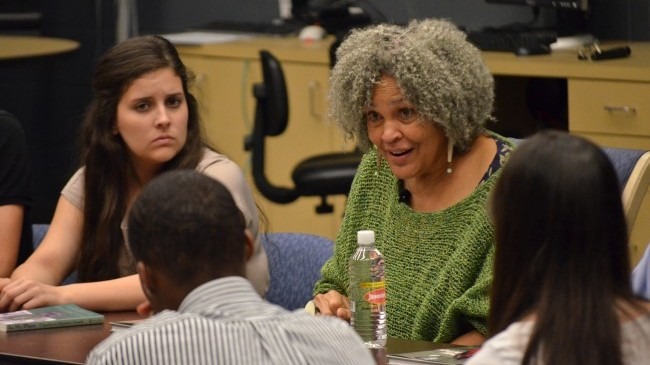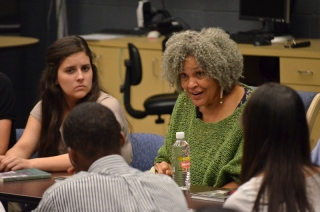 By ANDRE MACK-ROBINSON – Variety Writer
By ANDRE MACK-ROBINSON – Variety Writer
Senior Andre Mack-Robinson describes his experience with a conversation with Charlayne Hunter-Gault.
Growing up in Columbia, S.C. for the first eight years of my life, I attended St. Martin De Porres Catholic School, a predominately African-American private elementary school. I studied and was taught in dept about African-American history everyday;it was our standards.
Local high school students were able to attend A Conversation with Charlayne Hunter-Gault on March 28 at the University of Georgia’s Grady College of Journalism and Mass Communications, where she discussed her experiences while writing her newest book. Photo by Carlo Nasisse.
At that school, we took pride in singing the black national anthem, “Lift every voice,” right after the Pledge of Allegiance. We were educated about our past but lacked the passion, the sorrow and the adversity our ancestors experienced.
Recently, I’ve found myself frequently reminiscing about a life-changing event that I had the pleasure to attend on March 28 at the University of Georgia’s Grady College of Journalism and Mass Communications. I had the honor of meeting an African American hero: Charlayne Hunter-Gault.
The privilege to be there immediately hit me when I walked in the WUGA-TV studio. Knowing the occasion would be televised showed the importance.
Along with four other students from Clarke Central High School and 14 students from other Athens area schools, I was involved in an intense round-table discussion with Hunter-Gault about her new book, To the Mountaintop: My Journey through the Civil Rights Movement.
Hunter-Gault was one of the first African-Americans to integrate UGA with Hamilton Holmes in 1961. In her first book, In My Place (1993), she describes the personal journey during her time spent getting into UGA, her time in college as well as after graduation.
She pursued journalism as her career, just as I would like to do, so I was amazed to know she was the first black writer for The New Yorker magazine. Working as a reporter for The New York Times, The MacNeil/Lehrer NewsHour, National Public Radio and CNN are incredibly impressive credentials I strive to achieve.
Her process of writing To the Mountaintop: My Journey through the Civil Rights Movement began with research. She explained that many people in American only knew two Civil Rights activists—Martin Luther King Jr. and Rosa Parks. So began her first draft to give spotlight to others’ courage such as The Freedom Riders and local Civil Rights Activists she met at local Atlanta sit-ins.
The process she went through while writing the book, and the message that she wanted to get across to readers, taught me lessons and morals I never connected to the Civil Rights Movement. These lessons primarily concerned why it’s important to know your history, a question she visited many times throughout the discussion.
“If future generations know the history of the struggle, they’ll live in a better America,” Hunter-Gault said.
This quote meant a great amount to me; I felt the passion and the deepness she wanted us to understand. She explained why it is important to understand the hardships and social battles so we can appreciate and know our rights as Americans. She went on and talked specifically about one of the conflicts she encountered while attending UGA.
After UGA lost a basketball game to a rival school, white students rioted outside Hunter-Gaults’ dormitory. Out of anger, the students threw bottles and bricks, breaking her windows. Police sprayed tear gas to control the crowd as they escorted her out. The only thing that came to her mind was a Bible verse: Psalm 23:4, that her grandmother made her remember as a child.
“Yea, though I walk through the valley of the shadow of death, I will fear no evil,” Hunter-Gault said.
The emotion in her voice drew me closer to hear more.
While I sat in and conversed with her, it made me flashback to all the lessons I learned at St. Martins De Porres. This was the first time I had met a civil rights activist, and the magnitude was stronger than any teacher that had given me information about the Civil Right Movement.
The event was such a blessing to attend. Being able to meet an influential journalist and Civil Rights activist was such an amazing opportunity.
Knowing that she was one of the stepping stones for African-American entry into UGA and schools around the country makes me have great appreciation for her. I will take the lessons I learned from that event on my path through life.

